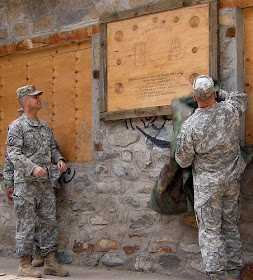
 Holding the pass, Fort Apache
Holding the pass, Fort Apache Combat Outpost Lowell, Afghanistan 2008
Combat Outpost Lowell, Afghanistan 2008You can take this story and remove the date/line and the air support and it would be interchangeable with accounts of an outpost in hostile territory in the 18th or 19th century. The heraldry of the following unit was earned in our own American frontier. 4th Cavalry and Frontier Cavalry
This report from New York Times reporter, C. J. CHIVERS who reports from COMBAT OUTPOST LOWELL, Afghanistan.
The small stone castle, sandbagged and bristling with weapons and American soldiers, rises from a rock spur beside the Landai River. Mountains lean overhead.
Once a hunting lodge for Mohammad Zahir Shah, Afghanistan’s last king, the castle is home for a year for an American cavalry troop, an Afghan infantry company, a Navy corpsman and two American marines. In the deadly contest for Afghanistan’s borderlands, it plays what might seem a singularly unattractive role. The position lies exposed near the bottom of a natural amphitheater deep within territory out of government control.
Insurgents hide in caves surrounding it and in villages nearby, operating unhindered almost to the castle’s concertina wire and lobbing mortar shells toward it at will. The steep slopes facing the walls are littered with shattered boulders and trees blown to splinters by the artillery and airstrikes with which the soldiers have fought back.
Described by one officer as a "bullet sponge." the outpost in reality serves as a speedbump against infiltration by Taliban forces from the Pakistan tribal areas. They live a life more reminiscent of their fellow 4th Cavalry bunkies 130 years removed, who served in remote outposts guarding against Comanche and Apache raids in the old Southwest, or more recently a remote fire base in Vietnam forty years ago.
While the soldiers wait, their days are filled by the routines of life in a hostile land. Soldiers stand guard around the clock. Each soldier is allowed to sleep in brief shifts, in crowded bunk rooms shared with bed bugs, flies and mice, while other soldiers man the guns.
By day the soldiers burn garbage and the stinking waste accumulated in latrine barrels. In the summer, many of their mattresses were so badly infested with parasites that they burned them, too.
At night the soldiers douse the smoldering pile so its red glow does not guide the Taliban’s aim.
When I read this, flashbacks of burning shit, and the cry "incoming.\," singed my memory and I felt a kinship that only can be shared by those who have lived that experience... still fresh after forty years.
Resupply and troop rotation can come solely by helicopters, because the twisting dirt road to the castle has been made impassable for military vehicles by the destruction of two bridges — one that collapsed and another that was blown up by the Taliban. Barring an emergency, helicopters risk flying here only at night.
The comparison is too real and the mission vital to blocking the pass, until more reinforcements can be deployed to plug the gap.
Read the whole story.
Then take a moment to "Jin the cavary" as Sgt. Quincannon said in She Wore a Yellow Ribbon.
and spend a little time with the men of Outpost Lowell.
After reading this article, I realized that this was the second time I had posted something about these brave souls. A Warning, a Blast, a Fight to Save an Afghan Life was linked in an earlier post, Course Adjustments and The Return of Optimism
COMBAT OUTPOST LOWELL, Afghanistan — Jamaludin, an aging Afghan cook, twisted and writhed on the green stretcher. Blood ran from his mouth and nose. Medics had cut away his clothes, revealing puncture holes where shrapnel from a Taliban mortar round had struck him minutes before.
Capt. Norberto A. Rodriguez, an American Army doctor, listened through a stethoscope as two Army medics and a Navy corpsman inventoried Jamaludin’s wounds. There were holes on his back, neck, buttocks, left leg and beside his right eye.
Capt. Norberto A. Rodriguez, an American Army doctor, listened through a stethoscope as two Army medics and a Navy corpsman inventoried Jamaludin’s wounds. There were holes on his back, neck, buttocks, left leg and beside his right eye.
Let us hope that the men of the 4th Cavalry, and their Marine and Navy comrades make it home safely. To a man, they have earned our nation's gratitude.
No comments:
Post a Comment